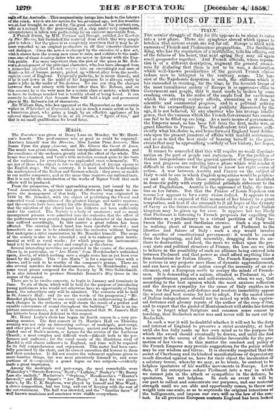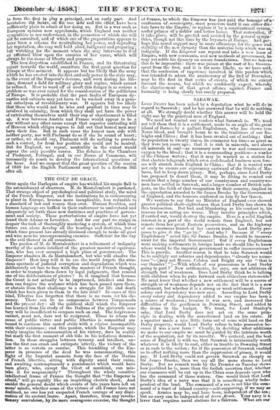Tat Ietl ii :dtlaU 141, 4)11 " ' , ; 1 ' } j .. , ; .
Tin: secular fuggle of liallii:coratu fi '.14ple a 4,0 be about to enter into a new P e. There f ti? ;Elm.
itrope is tilled,with bad which appear to
betoken tlia egrieus even,teAr4 liff° rumours of I rAey'aiid Pii.,04, 0 ) i . The Sardinian King, who has the. repilltatise.o4tNu i; IA, 4.1:7 his oft1.41:4?, out oftbe fulness of his Ilearthtliag nextAryig,15. may-ili ag" in smell gunpowder together, ,4.dd. irre.7,A , whose rept; tiou is of a diffeirbat tWerki elt#4 iiptgm; e [general uneasi- ness by declaring that the're* A . hi .9ulyur, a declaration
54 J (1 I
which well-kuown peculiarities -4f,...tlia iirli,s0., French regime induce men to interpret in the 'ebiiir. .lanni4e. The tell-
/
sion of the Napoleonic despotism is aught li e, stillness which it has succeeded in creating,. for the ctie, ,iL. e feverish breast of the most tumultuous society of Europe' is so,oppressive alike to Government and people, that it Must net *strokeu by some crashing events. In the midst of the ann4e jr,04:fer excitement which this stirring centnry affords, nbeiniding as it does in scientific and commercial progress, andig ti.,: ethical activity 4 due to the extraordinary. ACans of publiStk. :Jiro-m(1 by the age, it is not believed, by "a observer. te, .{ average intelli- gence, that the vacuum which the Freneh,Gio,vezUMeut has created can fail to-be filled up ere long. As a mere means of government, , the 'Emperor must, as has been felt from the first, make war,,or, grant liberties to France. The Montalembert trial proves sot- ciently what his choice is, and henceforward England must delibe- rate upon the present juncture of aflhirs with twofold serialist-Less, and so as to find the best mode of hearing herself ill the grave events that inay be approaching Ivorthily of hc-r history, her hopes, and leer duties.
- It cannot be concealed that this will require no small discrimi- nation on the part of people and statesmen. For the problem of Italian independence and the general question of European liber- ties and progress are entering into a phase which will render it difficult in the extreme for England to know her right course of action. A war between Austria and France on the subject of Italy would be one in which Englisheyinpathies would be perplex- ed and at fault. Both these empires appear to be identified in domestic polity -with every plilitical: principle abhorrent -to the soul of Englishmen. • And-ria is the oppressor of Italy, the Men- boa on her future. But that the Franoe of Louis Napoleon can rescue her appears to bob a sorry vision indeed. it appears to us that Piedmont is exposed at this moment of 'her history to a great temptation, and that if she suceurab to A alt hopes of the dynasty of Savoy as the future constitutional monarchy of a great Italian kingdom may be given up for ever. It appears but too likely that Piedmont is listening toFrench proposals for expelling- the Austrians as a preliminary to a virtual partition of Italy be- tween the French and Sardinian crowns. Such a step would be nothing short of treason on the part of Piedmont to the liberties and future of Italy : such a step would involve the sacrifice of constitutional government: it would be cursed from the beginning, and fail miserably, dragging down its au- thors to destruction. Indeed, the more we reflect upon the pre- sent state and political structure of France, the less are we able to believe in the possibility of such an alliance being entered into between Piedmont and that power as shall afford anything like a firm foundation for Italian liberty. The French Emperor cannot be serious in any projects save those of dynastic aggrandizement, and can have no motive of action except the necessity of an ex- citement, and a European melee to occupy the minds of French- men. It is demanding of a nation, situated as Piedmont is, al- most superhuman patience and self-restraint, when we say, that according to the best opinion which the most anxious reflection and the deepest sympathy for the cause of Italy enables us to form, for the present, self-defence and resolute immobility appear the wisest and best course for her to adopt. For the sacred cause of Italian independence should not be mixed up with the equivo- cal fortunes and gloomy repute of the author of the coup d'etat, and to expect that the gaoler of Montalembert will strike her fetters off, is to forget what Scripture and common sense concur in teaching, that Beelzebub never was and never will be cast out by
Beelzebub. - .
In such a war it will be doubtful whether it will not be the duty and interest of England to preserve a strict neutrality, at least until she has fully made up her own mind as to the purpose for which the sword should eventually be drawn, and until she find a moment in the course of the hostilities favourable for the pro- motion of her views. In this matter the conduct and policy of the French Emperor may provide suggestions for the policy which may be our wisdom and virtue. It is shrewdly suspected that the secret of Cherbourg and its kindred manifestations of depreciatory insult directed against us, have for their object the inculcation of a salutary terror, whereby we may, as he trusts, be content to be helpless spectators of his warlike movements in Europe. Let us then, if his enterprises seduce Piedmont into a war in which we cannot join in the attack or sympathize in the defence, be spectators, but not helpless. In such an event it will be our part to collect and concentrate our purposes, and our Material strength until we are able and opportunity comes, to throw our weight into one scale, so as to supersede the original intentions of the belligerents, and impose our own will as the law of the con- test. In all previous European contests England has been looked
to from the *at pa play a, prim-4140nd- an eerly,part. And heretofore thl Aphis, o4_ft-loneid:0 and Wel OW, bare been sufficiently plain to admit of her doing _so._ But in a war such as European opinion now apprehentlaoyhich England can neither sympathize in nor understand,in the promotion of which she will Rate consulted, and of which one of the preparations appears to havd been a scheme for neutralizing her power, and degrading her reputation, she may well hold aloof, indignant and preparino. • btrt watchinc, for the moment when she niay intervene to deal an effectual blow upon the enemies of her cause, which wilt always be the cause of liberty an progress.
i
The iron despotism established n France, and its threatening aspect towards the world, constitute the first great question foi- Europe at. this moment. It appears but too likely that the army which lie has erected into the first And onlv power in the state may,, in the event of the Emperor's decease, and even during his life- time, demand a field for military glory and rapine, which cannot be refused. How to' ward 'off or avert this danger is as serious a problem as was ever raised for the consideration of the politicians of Europe. It is probable that the .past faults of European dy- nasties and cabinets may yet have to be washed away in a gene- ral cataclysm of revolutionary war. It appears but too likely that those who would not be Wise and prudent in time may be involved in catainity; from Which they shall not have. the power of extricating 'themselves until their cup of chastisement is filled. up.. A war between Austria and France would appear to be a' war without any other cause except that superior controling Will of Heaven which obliges rogues to fall out that honest men may have their due. But in such cases the honest men side with neither party, nor will Piedmont do so if she be sound, of heart ; or rather, we should 'say, Piedmont will do nothing to provoke such a contest, for from her position she could not be neutral. But • for England, we repeat, neutrality in the outset Would appear the only possible course. The debates in the Chambers of Piedmont, 'Portugal, arid in our House of Commons, will necessarily • do much to. develop the international questions of the hour. And we suspeot that the great question of the session of 1859 for the English. Parliament may not be a Reforni Bill after all.



































 Previous page
Previous page